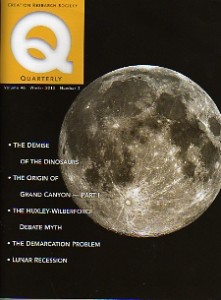 by Tom Hogan
by Tom Hogan
CRS Quarterly, Volume 46, Number 3
Winter 2010, pp. 119-125.
Abstract:
Two court cases, McLean v. Arkansas (“Arkansas”) in 1980 and Kitzmiller et al. v. Dover Area School District et al. (“Dover”) in 2005, showed how decisive philosophy can be when wielding the demarcation argument, as both creation science and intelligent design were denied victories because they were judged to be unscientific based on demarcation arguments. However, since the Arkansas decision and before Dover, the demarcation problem has generally come to be viewed by philosophers of science as intractable (i.e., “unsolvable”). The corollary of the intractability of the demarcation problem is that anything and everything can claim to be science without fear of being proved otherwise and that, therefore, the term “science” has no meaning. This has some clear implications for the creation project, including the renewed prospect for success in the courts and powerful answers to anti-creationist rhetoric.
pdf of article

